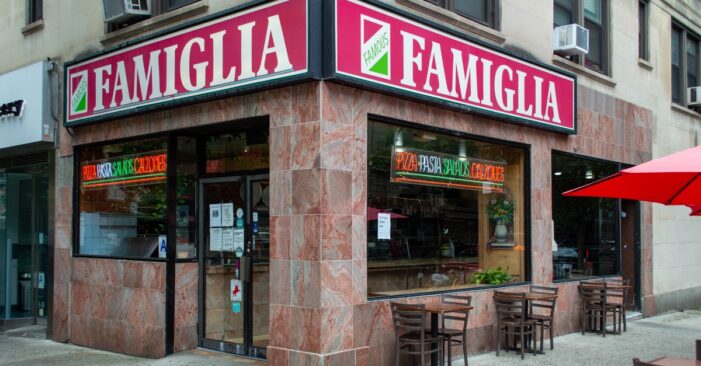Morningside Heights, New York, NY, USA – August 19, 2021: Window of Famous Famiglia pizza shop at 2859 Broadway. (Shutterstock)
By Andrew Rigie and Jessica Walker, NY Post
How to explain the city’s lagging recovery? Look no further than the pandemic-induced financial challenges still facing our restaurants and retail shops, which make up the economic backbone of New York City.
More than two years after COVID-19 ripped through the five boroughs, the city’s restaurant industry still employs 54,000 fewer workers than it did in February 2020, retail jobs are down 13% compared with total private-sector jobs (which are down 5% from pre-pandemic levels) and one in three Manhattan storefronts is vacant.
We’re all rooting for the New York we know and love to return, but if we’re ever to realize that triumphant comeback, we must do something. That starts with enacting smart policy solutions to revitalize restaurants and retail shops that are critical economic and cultural engines and key tourism drivers.
Fortunately, there’s hope for our city’s financial future. With higher-than-expected taxable receipts — upwards of $3.6 billion, the city comptroller reported this week — and robust federal COVID-relief funding in hand, the city government is in strong economic shape. So as Mayor Eric Adams and the City Council deliberate on a bulging $100 billion budget, it’s an opportune time to offer a break to our struggling small businesses — many of which are persevering against the odds and trying to pay off pandemic-induced debt.
What are restaurants and retailers requesting?
The city can finally help small businesses in direct ways that have only been talked about for years. While small-business grants would be ideal, we’re simply asking for city government to get out of our pockets. Here’s how.
- First, the city must start to reduce fines and quit using our small businesses as an ATM, as it has for years pre-pandemic. This year’s budget should reduce projected revenue from fines levied on small businesses by 50% — compared with pre-COVID 2019 revenue — across all relevant agencies.
This will reduce regulatory agencies’ incentives for excessive fining and couple well with Adams’ intent to have inspectors focus on education and compliance first, issuing penalties to small businesses only as a last resort. Reducing fines will also send the message that small businesses are valued for more than just their money and New York City is open for business.
- Second, reduce fees small businesses pay across the board, especially for restaurants that will participate in the permanent Open Restaurants outdoor-dining program that’s being developed. Pre-pandemic, many restaurants, including small women- and minority-owned businesses throughout the five boroughs, didn’t have sidewalk cafés because the revocable consent fees were cost-prohibitive. These fees must be reduced to limit financial burdens and make programs like outdoor dining more equitable and inclusive.
- Third, eliminate the unjust commercial rent tax for all non-chain retail storefronts and restaurant/bar/club tenants. It’s a unique tax that effectively adds up to a 3.9% surcharge that only businesses located south of 96th Street in Manhattan pay on their annual rent; CRT has been repealed citywide but for this one geographic area.
Eliminating the discriminatory CRT burden is exceedingly important, particularly for storefront businesses in Midtown and lower Manhattan fighting to recover from the pandemic while grappling with the slow return of office workers and tourists. The effect of eliminating the CRT will be felt citywide since these businesses employ New Yorkers living throughout the five boroughs, and their longevity is vital to the tax base, which funds essential services in communities across the city.
These three critical proposals will help ensure the recovery of businesses vital to New York’s future. Funnily enough, these proposals aren’t even that novel — they are overdue ideas, grounded in ideals of how government should treat our city’s businesses, whose time has long come.
Flush with higher-than-expected tax revenue and federal dollars, local government must not only fund our city’s essential services but defund its regulatory fine and fee complex that’s drained our essential small businesses for too long. If government budgets are “moral documents,” as the saying goes, this New York City budget should go big on small businesses because reducing fines, fees and taxes is the right thing to do.
There’s too much at stake otherwise — for these vital restaurants and retailers but also for New York’s economic, social and cultural revival.
Andrew Rigie is the executive director of the NYC Hospitality Alliance. Jessica Walker is the president and CEO of the Manhattan Chamber of Commerce.

